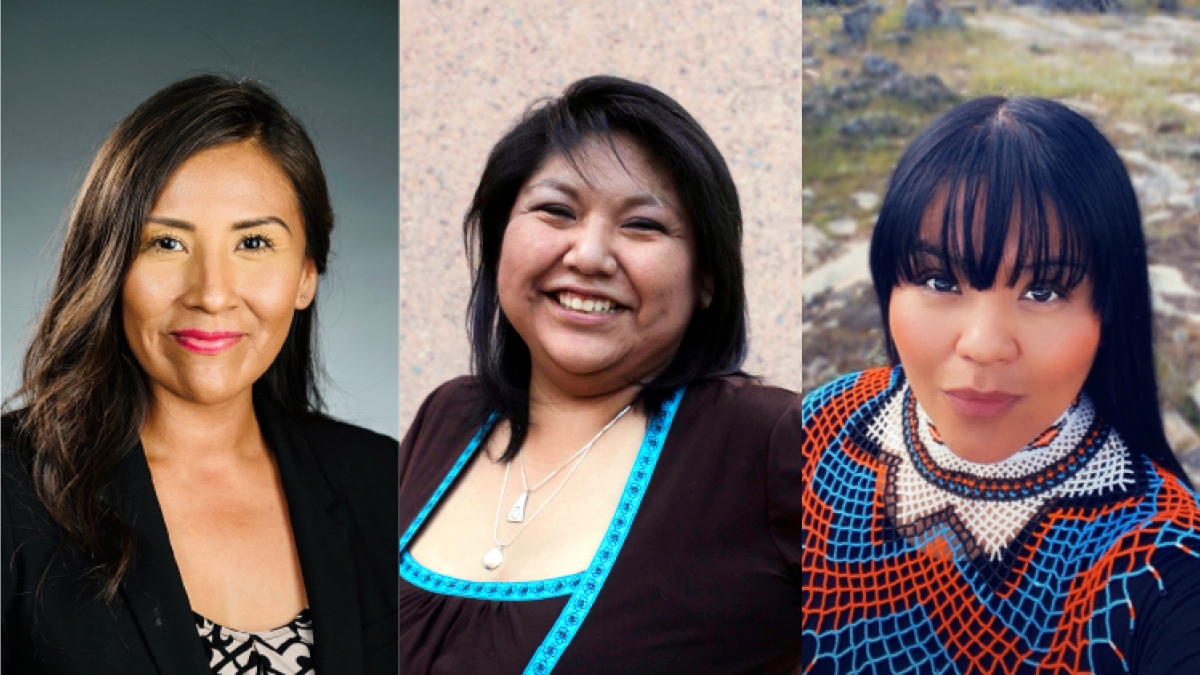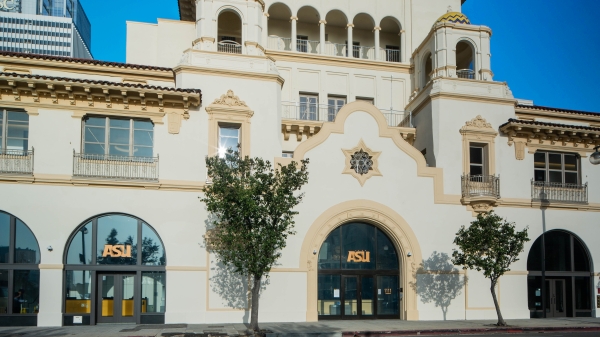ASU Law Indian Legal Program alumni pursue work that matters for Indian Country
ILP alumni attribute ASU Law’s unique classes, real-world work experiences to advancing their career journeys

Alumni like Candace Begody, Paula LeBeau and Janet K. Bill are using their ASU Law Indian Legal Program experiences to make an impact for Native communities.
Three different stories from three inspiring Native women — all with one thing in common: a degree from the Indian Legal Program (ILP) of the Sandra Day O’Connor College of Law at Arizona State University.
A tribal nation associate judge, an Indian law fellow at a firm providing legal services to Indian tribes and tribal organizations, and a JD grad who recently passed the bar exam and is now pursuing an MBA — these ASU Law alumni are using their ILP experience to make an impact in diverse roles and communities.
Paula LeBeau
Paula LeBeau, who earned her ASU Law Master of Legal Studies (MLS) degree in 2014, is now associate judge for the Salt River Tribal Court in the Salt River Pima-Maricopa Indian Community.
As an MLS student, LeBeau was employed by her tribe, the Salt River Pima-Maricopa Indian Community, and had the opportunity to accept a temporary position as an acting assistant court administrator. After graduation, she was hired in the office of general counsel as a tribal court advocate where she practiced in the tribal court, representing the community in civil court matters. In April 2016, she was sworn in as an associate judge in the community court, currently presiding over the juvenile court in dependency, delinquency and truancy matters.
“While working in the field of Indian law, there was a hard realization that there is a huge need for law-trained advocates,” LeBeau said. “The resources and education I received from ASU Law have given me the tools to serve those that would otherwise have no legal representation or advisement. The Tribal Court Trial Skills College has been incredibly helpful to raise the quality of our tribal courts. The ILP at ASU Law is such a good resource for the local tribes as well as Native communities throughout the country.”
“While working in the field of Indian Law, there was a hard realization that there is a huge need for law-trained advocates. The resources and education I received from ASU Law have given me the tools to serve those that would otherwise have no legal representation or advisement.”
— Paula LeBeau, ASU Law MLS 2014 grad and associate judge for the Salt River Tribal Court
She said prospective students should choose ASU Law’s ILP for one reason alone: the people.
“The people that you meet at ASU Law will challenge you, support you and stand with you,” LeBeau said. “It is no secret that law school can be difficult. It can be a strain mentally, financially and socially. The ability to meet and network with others in the field of Indian law can be a big help to you in your career. I have had many ASU Law alumni mentors while working at Salt River.”
Her advice for students is to “be confident, keep your eye on the prize, and seek out others who can help you get through the tough times.”
“I’m not sure I would have made it through without the incredible people at the ILP,” LeBeau said. “I will be forever grateful to Ann Marie (Bledsoe Downes) and Kate (Rosier) for being real and encouraging me to cross the finish line. Don’t be afraid to seek out alumni that work in your area of interest. We are truly lovely people.”
Janet K. Bill
Similar to LeBeau, ASU Law ILP alumna Bill hopes to become a tribal council member for her tribe, the Picayune Rancheria of Chukchansi Indians, and also aspires to be a judge.
Bill, who began her ASU Law ILP journey through the Native American Pipeline to Law (PTL) program, earned her JD in spring 2020, took the October 2020 California bar exam and is now an Indian law fellow at Berkey Williams LLP. The firm works with tribes and tribal organizations to help them achieve political, cultural, social and economic autonomy.
“During my time at ASU Law, the ILP provided an abundance of classes dedicated to preparing students for a legal career in Indian Country,” Bill said, adding as examples courses she took in Indian gaming, cultural and natural resource protection, economic development in Indian Country, and the wills clinic.
The ILP also gave her the opportunity to serve as a student attorney in the Indian Legal Clinic, where she gained hands-on experience on how to represent clients in tribal court. In addition, Bill earned an ILP summer fellowship and had various other opportunities to network with tribal leaders, public officials, judges, attorneys, alumni and other students.
“Through these experiences, I was able to expand my network and form lasting mentorships to guide me through my legal career in Indian Country,” Bill said.
Bill’s primary goal is to continue to serve Indian Country in whatever capacity that she can, and she highly recommends the ILP as an ideal conduit for prospective students to do the same.
“Remember that pressure is a privilege and to let go of the things that are out of your control,” said Bill of her advice to current ASU Law students. “Also, ASU has an amazing alumni network so make sure to use those connections.”
Candace Begody
Begody, also an ASU Law spring 2020 JD grad, recently passed the Arizona bar exam and is now pursuing her MBA degree in 2021.
After a rigorous spring and summer prepping for her JD graduation, MBA finals and the bar, she has been spending time with family at her Navajo Nation home. While homeschooling her son and working through her final year of business school, she also has been taking on journalism and legal research contract jobs in pursuit of her ultimate goal of becoming a licensed attorney.
Like Bill, Begody says she chose ASU Law because of the unique curriculum and opportunities offered.
“The ILP offers classes I couldn’t find anywhere else,” she said, calling out foundational classes on federal Indian law, Indian gaming, tribal economic development and cultural resources, and an advanced legal writing class that focused on serving Native clients.
The toughest but most rewarding class, she says, was the Indian Legal Clinic, where she and fellow students worked directly for, represented and found resolution for tribal clients under supervising attorneys including Patty Ferguson-Bohnee, Helen Burtis and Ed Hermes.
“I got to work on an Indian Child Welfare Act case and a business formation case, and we also argued our first simulated full trial,” she said. “I also had the opportunity of being a judicial extern for U.S. District Court Judge Diane J. Humetewa (1993 ASU Law grad). This was simply an amazing experience — there was a lot of writing and research involved, and I was also able to argue a case before the judge with another extern.”
Begody says the support and mentorship of the entire ASU Law community made all the difference in her success on the bar exam “because they not only care about the law, but about producing legally competent individuals who will serve with heart and integrity.”
“Seeing my name on the bar passage list truly humbled me and made me think of my experience at ASU Law with a different set of lenses,” she said. “While I was truly happy to graduate, I still felt that there was a battle before me — studying and taking the bar exam. And when I saw my name, it made me think of how tough my classes truly were, and how blessed I am to have been molded by the ASU Law community.”
Begody added that ASU’s ILP faculty are “some of the most brilliant legal minds of Indian Country, and every one of them challenged me and continue to be mentors today.” In addition, she had many ASU Law leadership and faculty to thank including Assistant Dean Thomas Williams, Arizona Supreme Court Associate Justice Clint Bolick and U.S. District Court Judge John Tuchi, along with Myles Lynk, Jessica Berch, Bob Dauber, Laura Coordes and John Becker.
For current students, Begody offers this advice:
“One of the teachings that my parents and grandparents instilled in me at a young age was the idea, ‘T’áá Hwó’ Ají T’éego,’ which means ‘It has to be you’ in Navajo,” she said. “The only true limitation is the one you put on yourself. Throughout my journey, I heard a lot of doubt, and sometimes that doubt came from myself. I had no idea how, as a first-generation law student, I was going to work on a law and business degree concurrently, still be present as a mother, and still pass the bar exam.
“But much of my success came from my parents’ teachings and the love and support of so many of my friends and family, all of whom reminded me that it comes down to you and what you believe in your own capabilities. Believe in yourself because what your heart and soul go after can truly be attained.”
More Law, journalism and politics

School of Politics and Global Studies director's new book explores mass violence
Why do people commit atrocities and why are certain groups, including religious and ethnic, more vulnerable to large-scale…

ASU faculty contributing to improvement of Wikipedia
Many academics have a love-hate relationship with Wikipedia. While the website has information about almost anything you can…

ASU Law students gain vital experience through Los Angeles location
Students at the Sandra Day O’Connor College of Law at Arizona State University may be concentrated in the school’s downtown…